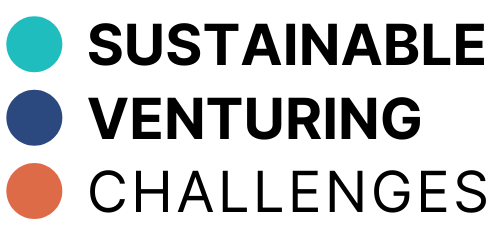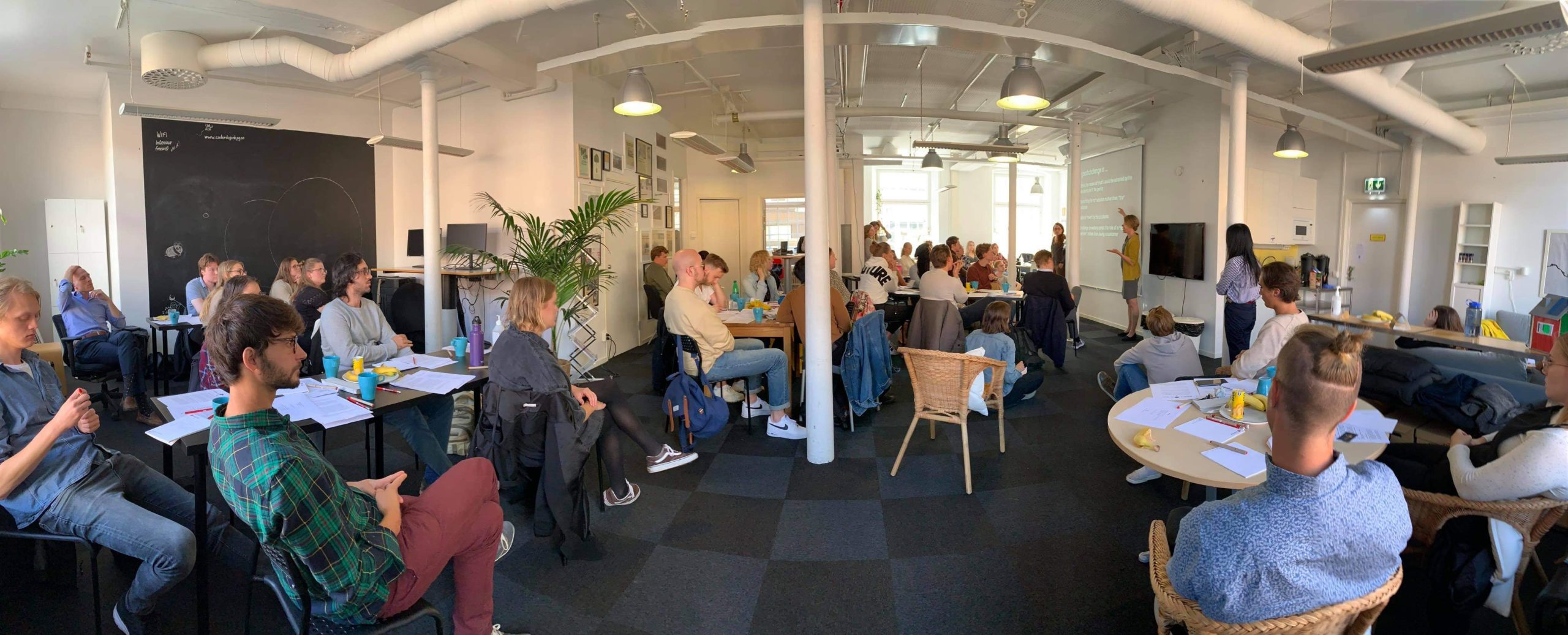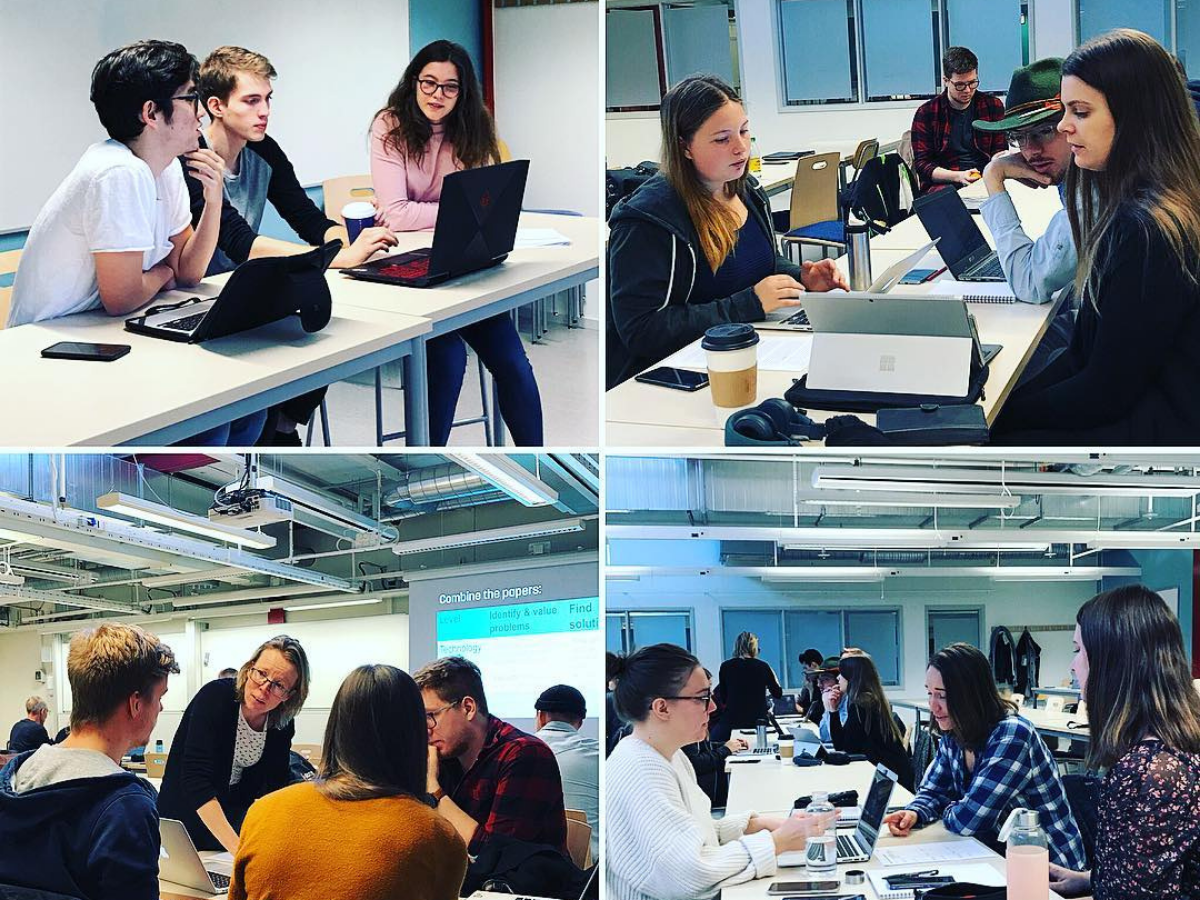“University staff learn how to switch between the roles of teacher, coach and organiser”: Prof Dr Charlotte Norrman, Linköping University
Prof Dr Charlotte Norrman is Associate Professor at Linköping University in Sweden where she teaches in the Division of Project Management, Innovation and Entrepreneurship at the Department of Management and Engineering. She is co-developer and organiser of the InGenious project, which offers challenge-based innovation and learning across a network of European universities (ECIU) and companies. We spoke to Charlotte Norrman to learn more about her motivation to take up challenge-based learning in her teaching and her role in the InGenious challenges.
Why did you decide to include a challenge-based learning format in your curriculum?
Prof Dr Charlotte Norrman: Before joining Linköping University around 20 years ago, I had gathered industry experience for about ten years, mostly at organisations in the entrepreneurial support system. So, when I first started my journey at Linköping University as a PhD student, I brought in a very practice-oriented view and right away, started to co-develop courses in which we worked with external idea owners. So, essentially you could say that I have worked with practice-based learning for 20 years now.
Eventually, I started to work with external actors more as challenge providers, meaning that the companies present a challenge they are facing and provide my students the opportunity to help them in finding a solution to that real-life problem. I have mostly moved towards challenge-based learning, because I believe that it greatly enhances entrepreneurial learning and experience. Also, I have noticed that it increases student motivation, because the students realise that the companies are genuinely interested in the ideas and solutions they come up with and that they are very open to co-develop and discuss with them at eye-level. In this way, the students get more relevance and acknowledgement in what they do. Of course, that doesn’t mean that all students are motivated to work with challenges – but speaking from my experience, most do!
What has your experience been like?
Prof Dr Charlotte Norrman: One of the biggest challenge-based projects I have been involved in is the InGenious project. Since 2016, I have co-developed this course together with my colleagues. When we started out, we laid the foundation for a course in which students work on real-life challenges brought forward by companies, public bodies or civil organisations. We then continued to develop and gradually adjust and improve the course strategy, in constant interplay with academic staff from other universities, such as Twente University in the Netherlands and Stavanger University in Norway.
In the InGenious challenges, we generally go through three phases which follow the ECIU (European Consortium of Innovative Universities) approach: ‘Engage, Investigate and Act’. The first phase is about the students taking on the challenge. As academic staff, we want our students to be fully engaged in the challenge, so that they can move on to the second phase in which they start to investigate and collect information. This enables them to move onwards to the third and final phase in which they come up with their solution.
We have also been inspired by the pedagogical framework ‘Conceiving, Designing, Implementing, Operating’ (CDIO™), which is quite similar to ECIU’s ‘Engage, Investigate and Act’ approach, actually. It was championed by the CDIO™ Initiative which holds the view that engineers must be able to engineer. The same way probably no one would want to be treated by a freshly graduated surgeon who has only studied theory, the goal is to educate and train engineers that have both knowledge and skills.
Professor Charlotte Norrman introduces students to the challenge-based InGenious module. © Linköping University
As academic staff, what exactly is your role in challenge-based learning?
Prof Dr Charlotte Norrman: I identify with what the ECIU refers to as ‘teamcher’, which, and according to a paper that we are currently working on, actually encompasses three roles. The first is that of the teacher where the focus is on knowledge creation and transferring knowledge and facilitating knowledge building. The second role is that of coach, which is more skills-oriented. As a coach, you work with questions that stimulate students to improve their skills, especially 21st century skills such as being creative, flexible and innovative, being able to work in groups, being able to search for information and question things in a constructive way, etc. All these kinds of skills are facilitated by the coaching role. The third role is that of the organiser, as you need to work with the challenge providers and set the scene. This requires a lot of organising.
I think that all of those roles can be held by one single person, but it is better if they are shared between several people – especially in the context of courses or big events. It is important for university staff to learn how to switch between these three roles. That can be challenging, especially if you’re mostly used to the traditional teacher role. But to be able to successfully arrange and carry out challenge-based activities or courses, you really need to be able to take on all three roles.
How do you facilitate your students’ learning and development processes during challenges?
Prof Dr Charlotte Norrman: I really want my students to understand entrepreneurship, not just to read about it. That means that I motivate my students to step into the shoes of an entrepreneur. For instance, when it comes to the question of “Who is my customer?”, there really is only one way to go about it: to go out there and find out. Oftentimes, the students are shocked at first. However, after having talked to the first presumptive customer they begin to understand why I ask them do so. For instance, it might help them realise that the customer doesn’t like the idea they propose at all. This challenges them and helps them to understand what it is like to be an entrepreneur. Instead of just learning that entrepreneurs go out to speak to customers, they do so themselves and learn from this experience.
So, I really believe students need to both read about entrepreneurship and relate it to a context through first-hand experience. That is also why I have decided to incorporate this into my grading and make it a minimum requirement for a pass to have talked to at least one potential customer.
“Experiential learning such as challenge-based learning allows students to gain both theoretical knowledge and practical skills. While it’s a tougher way for students to acquire new knowledge and skills, at the same time it’s a much more impactful way. The course results confirm this.” – Professor Charlotte Norrman
In your view, what are the advantages of taking up challenge-based learning formats in comparison to research-, problem- or project-based learning?
Prof Dr Charlotte Norrman: Well, I think there are actually many similarities between problem-based and challenge-based learning, since they both have their roots in experiential learning. But in comparison to problem-based learning, which usually aims at finding the solution, challenge-based learning revolves more around finding a solution. I think one could say that challenge-based learning is more entrepreneurial. The focus lies less on the one right answer, but rather on the journey taken towards developing a solution – which in the end, maybe isn’t even so much the perfect solution.
In general, problem-based learning is a little ‘stricter’ which can work well in certain settings. For instance, it is a suitable approach in health-care where you work with diagnosing problems to determine the one suitable cure to the problem. But sustainability problems, wicked in nature, can be solved either one way or another way – there isn’t a single right answer. Here, the challenge-based learning pedagogy is more suitable, in my opinion.
The drawback is that challenge-based learning entails a lot of VUCA (volatility, uncertainty, complexity and ambiguity), which can be hard to handle for the students. Another drawback is that it requires resources.
As part of her challenge-based courses, Professor Charlotte Norrman offers the ‘Responsible Innovation Seminar’ to support participating students in developing and refining their solutions. © Linköping University
How to best ensure successful university-business collaboration in sustainable venturing challenges?
Prof Dr Charlotte Norrman: I think it’s a lot about aligning expectations. For instance, it’s important for university staff to inform the challenge provider about how to formulate challenges. Ideally, they are formulated in an open and broad way. The challenge provider should also be made aware of the fact that they should not expect to receive the solution, but a solution. It is not about steering or monitoring the students, but working and co-developing a solution with them. Besides, all involved need to understand that they need to be prepared to invest time into preparing and carrying out the challenge.
How relevant for the future is challenge-based learning and cooperation between universities and companies, in your opinion?
Prof Dr Charlotte Norrman: I think it is highly relevant, especially with regard to the development of regional innovation ecosystems such as the European innovation ecosystem. In such a system, competence supply is very important. Challenge-based learning formats are a great way for both industry and governmental bodies to get in contact with universities.
For universities, they create relevance in their education through working with real-life problems and fusing the development of knowledge and skills. Similar to what the CDIO™ Initiative postulates, I believe that theoretical courses are needed, but it is also important for students to gain practical knowledge and skills. Experiential learning such as challenge-based learning allows for both. While it’s a tougher way for students to acquire new knowledge and skills, at the same time it’s a much more impactful way. The course results confirm this.
Really, I think it’s a natural way of learning and something that is not new at all. Already in 1924, Mary Parker Follett spoke of the importance of combining theory with practice in learning. I’m glad to see that at the moment, more and more actors are picking up on this.
Would you recommend other university staff to take up challenge-based learning into their curricula, and if so, why?
Prof Dr Charlotte Norrman: Yes, I would! Though I would add as a sidenote that one should be aware of the fact that this can hardly be done within a day, but is a steady learning process. It can be especially challenging for those teachers to take up who have so far practiced rather traditional, knowledge-based teaching. It also requires quite some investment of resources, as well as an extensive network to find challenge providers and develop challenges with them.
For this reason, I think a good way to get started with integrating this form of learning into your curriculum could be to become part of a ‘teamcher’ team. All in all, while it is definitely not an easy way of doing your job, and doesn’t necessarily fit every teacher, it can be extremely fulfilling and fun – not only for university staff, but challenge providers and solvers alike.

powered by ScaleUp4Sustainability
Carl von Ossietzky University of Oldenburg
Department of Business Administration, Economics and Law
Adj. Prof. Innovation Management and Sustainability
Ammerländer Heerstr. 114-118, 26129 Oldenburg, Germany
Legal notice and data protection

The platform was created as part of the ScaleUp4Sustainability project. ScaleUp4Sustainability (Project Reference: 601150-EPP-1-2018-1-DE-EPPKA2-KA) is funded by the Erasmus+/Knowledge Alliance Programme of the European Union.



